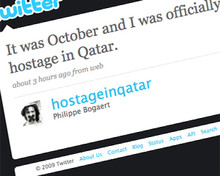
It's a complicated story narrated tweet-by-tweet, via an account he has named HostageinQatar. As yet, information has come directly from Bogaert himself although Journalism.co.uk is following up with relevant parties for more information.
The Belgian embassy in Doha, tells Journalism.co.uk that the 'proof will be in the [eating of the] pudding' as to whether Bogaert's Twitter effort succeeds. "We continue to do what we can to help him," a spokesperson says.
Bogaert claims that his employer, Dialogic Qatar, is refusing to issue him an exit visa, and as a result is unable to leave the country, under Qatari law.
Some observers however, have raised concerns about the way he has branded himself as a 'hostage,' in the comments on the QatarLiving forum, for example. As many questions as facts arise from his Twitter story: was he naive in taking the job position? Why isn't he being helped by the human rights or press freedom organisations? Is he doing more harm than good with this method of social media communication?
The story told by Bogaert
In October 2008 Bogaert tendered his resignation as managing director to Dialogic: it was accepted by the Belgian parent company, Dialogic SA, but not the Qatari employer.
Dialogic is a subsidiary of Belgian company, Dialogic SA, which was originally contracted to organise the Qatar Marine Festival, a project in which the Emir of Qatar's wife, Sheikha Mozah, is involved. The Qatar Marine Festival Organising Committee has now terminated the contract with Dialogic Qatar, Bogaert reports.
Bogaert, who worked for the parent company in Belgium, first arrived in Doha in April 2008. He was then promoted to managing director in July 2008.
"I presented my resignation on October 27. My resignation was accepted by the chairman and the CEO of the Belgian company which is a 49 per cent shareholder, but it was never accepted by the Qatari sponsor [Farukh Azad]. So, officially I am still the managing director of Dialogic in Qatar," he says.
Side stories further complicate the main narrative thread: Bogaert says he signed cheques for the company which then bounced, further criminalising him in the eyes of the Qatari law, before he was able to use funds from family to pay them off.
Then, Bogaert claimed in a press release, his sponsor Farukh Azad, 'who under Qatari law would be responsible for the debts of the company he sponsored', launched a court case, 'holding him responsible for the failure of the project and demanding €3.2 million in compensation'.
"I am being held hostage in Qatar with a ransom of QAR16 million on my head," says Bogaert, in the release.
"This is a cautionary tale for westerners who come to work in the Gulf. You have no rights," he argues.
Bogaert is telling his story via Twitter, he says, because 'you never have a second chance to make a first impression'. A friend suggested he use the site as a means of keeping attention on the story, even if media coverage dwindled.
"Of course, it's a risk because you never know if it's going to take off or not, but it's really working very well," Bogaert says.
While Bogaert says that he was aware of the risks of Qatari law, he presumed his own caution would save him: "I know how I work so I thought it's worth the risks - let's do it."
Bogaert's full account can be tracked via his Twitter ID, with all tweets recorded chronologically at this link; and additional information is on his blog.
Getting press attention
While Bogaert knows Robert Ménard, Reporters Without Borders founder and currently heading the media freedom centre in Qatar - which has been facing problems of its own - he has, as yet, not been supported by any media freedom organisations: "I am a TV broadcast manager, not a journalist."
"Although I might become a journalist [in order to receive more support]," he jokes. Bogaert has written an open letter of apology on his blog, which he hopes explains his actions.
"The more people know, the more I can be helped. The [Belgian] ambassador is not very happy with the way I brought it up with the world. I put [up] an open letter to apologise to officials."
"The press is important. It's not the Sheikha [the Emir's wife] who is to blame - I'm trying not to link her name to him. It's not the fault of the government. It's the fault of the sponsor who uses the sponsorship law in an arbitrary way."
Bogaert's focus is on going home to his wife and two children in Belgium, he says, adding that he is frustrated communicating with them via Skype: "We were wary that this is going to be hard. She [his wife] is having a very hard time now."
"I know I am not guilty. If there is one person who is prepared to be a guarantor for me I might be out in no time - tomorrow!"
Journalism.co.uk has contacted the Ministry of Interior and Farukh Azad for further comment and will update in due course, on this site, or on the Editors' Blog.
Related links:
QatarLiving.com: Hostage in Qatar - Drama, Art or Reality?
Tarek Speaks Clever: Philippe Bogaert - a hostage in Qatar
LeSoir.be (translated via Google Translate): an explanation from Philippe Housiaux, former boss of Bogaert
Free daily newsletter
If you like our news and feature articles, you can sign up to receive our free daily (Mon-Fri) email newsletter (mobile friendly).
Related articles
- #JournalismMatters: The challenges of journalism in exile
- What to do if you are threatened with a SLAPP lawsuit
- WAN-IFRA: Five challenges to press freedom
- Economics woes affecting UK press freedom, RSF World Press Freedom Index finds
- Predictions for journalism 2024: misinformation, online safety and press freedom









